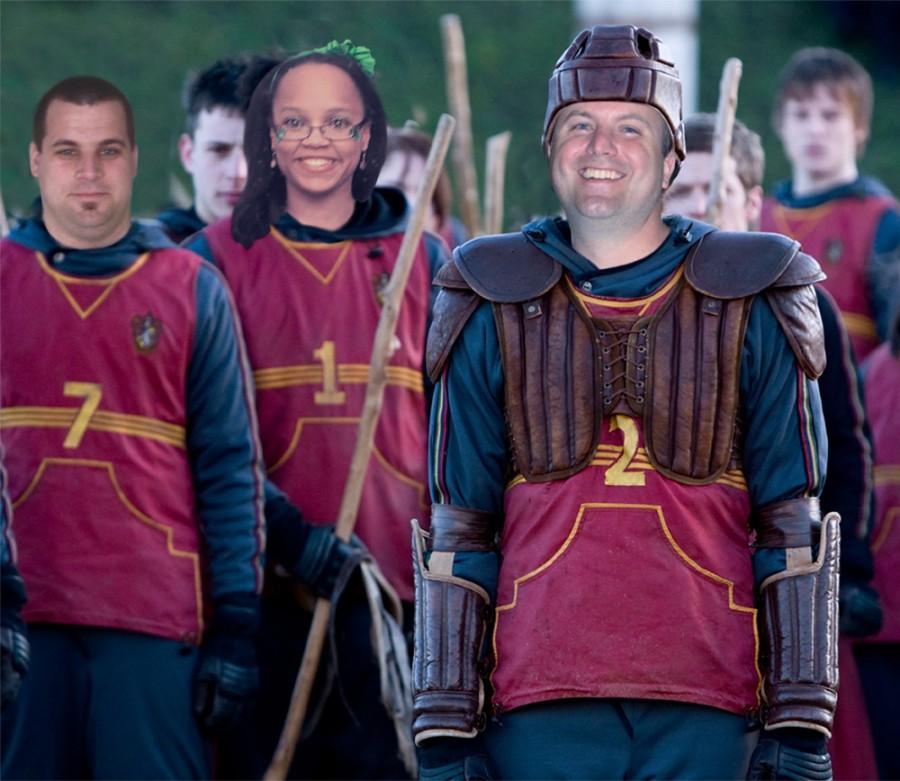Start with seven players. Give them some balls. Add seven broomsticks. And put them 50 feet in the air. Yield: one Quidditch team.
Guilford College’s newest club sport is flying into the Quidditch season with little more than the minimum required players, some second-hand equipment, and a reasonably-competent coach. Associate Professor of Political Science Kyle Dell offered to be the faculty sponsor for Guilford’s Quidditch team, called the EarthQuakers, after hearing about the club from a student.
“I found out about the team and thought, ‘I want to help them,'” Dell said. “I was an outside Chaser for the (Kalamazoo College) Kalamazoomers, and after college I was signed to play for the Massachusetts Chickadees. Playing professional Quidditch was my dream.”
Dell’s dream was crushed, however, when a Bludger, hit with too much force, slammed into his throwing shoulder at 80 mph.
“My shoulder was shattered,” Dell said. “The medics said I’d never play Quidditch again. So I became a professor.”
According to team co-captains Caiden Hogan and Trevor Denning, the EarthQuakers suffered from that insidious Guilford affliction, disorganization, before Dell stepped in to help with what he calls his help with what he calls his “Broomsticks and Beyond initiative.”
“We were completely winging it, on and off the pitch,” said senior Hogan, a Beater. “We really needed Kyle’s help.”
“We lost all four of our pre-season matches” added senior Denning, the second Beater. “Our cumulative score was only 360. Even the (High Point University) Hooligans were making fun of us.”
After three weeks of extra work-outs, though, the EarthQuakers are finally taking off as a team. A game on March 12 saw the EarthQuakers finish only 60 points behind the Washington and Lee Whirlwinds, with an amazing fifteen saves for the EarthQuakers by junior Kalyn Howard, the team’s rookie Keeper.
“I’m so excited,” Howard said. “I’m completely new to Quidditch. That was the first game I’d ever played.”
As a club, the EarthQuakers accept players with any level of experience, including none at all.
“I had only seen Quidditch on TV before,” Howard said. “I didn’t even know the difference between a blind side and open side Beater.”
For the Muggles among you, here’s a quick rundown of how a Quidditch game works.
Each team has three Chasers, who pass the Quaffle (a large red ball) between them and try to score through one of three hoops at the end of the pitch. Every goal is worth ten points. The Keeper guards the hoops and tries to prevent the opposing team from scoring. The two Beaters have to protect their team — and try to hurt the opposition — by hitting the Bludgers with short, baseball-bat-like clubs. The Bludgers are brown, smaller than the Quaffle, and intent on destruction. Finally, the Seeker tries to avoid getting hurt while searching for the tiny Golden Snitch. When the Seeker catches the Snitch, his team gains 150 points and the game is over.
“It’s a tough sport,” Dell acknowledged. “But I really admire (the team’s) dedication. I’ve seen a vast improvement in the last few weeks.”
“We’re learning a lot,” said Seeker and sophomore Jilly Campbell. “I played Quidditch some with my older siblings when I was younger, but the team has been practicing strategy and formation … it’s just amazing how much we’ve learned and how much we’ve improved.”
In Quidditch, team rankings are based on total points scored in league games. The EarthQuakers have played three league games and are ranked sixth out of seven teams in the league with a cumulative score of 410 points.
“My goal for the team is to get 1000 points in league games,” Denning said. “We’ve been improving a lot and I think we can definitely meet or exceed that goal.” The team’s next match-up will be against the Elon Excelsior on April 9.

